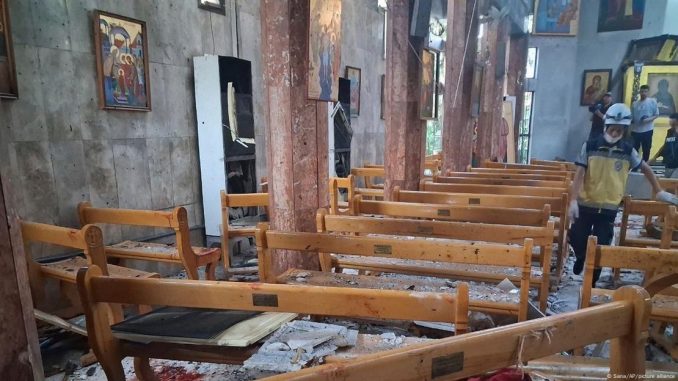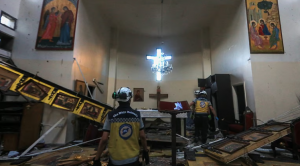
| Published June 22, 2025
Security sources said at least 20 people were killed and 52 injured, with the suicide bomber said to have been a member of the “Islamic State.”
A quiet Sunday mass turned into a scene of horror as a suicide bomber detonated explosives inside a Greek Orthodox church near Damascus, killing at least 20 worshippers and wounding dozens more. The attack—claimed by the Islamic State—marks the deadliest assault in the Syrian capital since the fall of Bashar al-Assad and has reignited fears of a jihadist resurgence. Shocking in its timing and brutality, the bombing has sent waves of grief through Syria’s Christian community and raised urgent questions about security in the post-Assad era.
⚠️ Attack Details & Immediate Aftermath
-
The suicide bomber, identified by Syria’s Interior Ministry as a member of Islamic State, infiltrated the crowded church, unleashed gunfire, and detonated the explosive inside. Witnesses also recount a grenade thrown during the chaos.
-
This attack marks the first successful church strike in Damascus since Islamist insurgents overthrew Assad in December—a grim sign of renewed extremist activity.
-
Victims included children, according to state media, as emergency crews continue to care for survivors amid scenes of shattered pews and blood-soaked floors.
🌍 Political & Security Context
-
Islamic State’s resurgence: Though IS has lost territorial control, capability to strike high-profile targets remains.
-
Fragile stability: Interim president Ahmed al-Sharaa’s government is struggling to maintain order, facing militia fragmentation and persistent security vulnerabilities.
-
Religious minority fears: Syria’s Christian communities—already wary under Islamist-led governance—now face renewed anxiety and calls for protection.
📌 Reactions & International Condemnation
-
Damascus authorities denounced the event as a “desperate attempt to destabilize” the nation and harm its peaceful fabric.
-
The Greek Foreign Ministry joined in condemnation, urging Syria’s transitional government to strengthen protection for minority communities.
-
UN and civil defence groups—including the White Helmets—have highlighted the need for urgent community reconciliation and safeguarding across religious lines.

A Syrian man reacts inside Mar Elias Church, where a suicide bomber killed several people in Dweila in the outskirts of Damascus, Syria, on Sunday. (Omar Sanadiki/AP)

Rescuers inspect the damage at the site of a reported suicide attack at the Saint Elias church in Damascus’ Dwelaa area on 22 June 2025. Syrian state media reported a suicide attack on a Damascus church on 22 June that caused casualties, as AFP correspondents at the scene saw first responders transporting people from the site. Bakr ALKASEM / AFP
 Implications
Implications
-
Resurgence of ISIS-Linked Terror
The attack signals a dangerous revival of Islamic State operations in Syria, despite years of military defeats. Their ability to strike the capital raises alarm about sleeper cells and renewed regional ambitions. -
Threat to Religious Minorities
Syria’s Christian communities now face heightened fear and vulnerability, potentially triggering a new wave of displacement or calls for international protection and asylum. -
Fragile Post-War Stability
The bombing exposes deep security gaps under Syria’s transitional government, challenging its legitimacy and capacity to protect citizens—especially amid ongoing militia rivalries. -
Regional Ripple Effects
Neighboring countries may tighten border security and surveillance, concerned that Islamist violence in Syria could spill over or inspire copycat attacks. -
Pressure on International Actors
Human rights groups and the UN may be pushed to reassess Syria’s security needs, potentially reviving stalled peace efforts and funding appeals for civilian protection.
💬 Overall Takeaway:
The deadly bombing at Mar Elias Church is more than a tragic flashpoint—it is a warning. As Syria struggles to rebuild after years of civil war and regime collapse, the reemergence of extremist violence threatens to unravel fragile progress. For the country’s Christian minority, the attack has shattered a sense of sanctuary; for the broader region, it signals that the Islamic State’s menace has not been erased—only waiting. Whether Syria’s leaders and international partners can prevent a deeper descent into chaos may now depend on what they do in the critical days ahead.





Be the first to comment